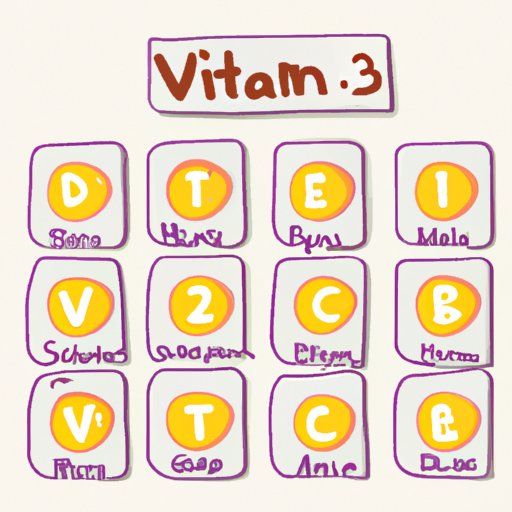
Introduction
It is normal to lose between 50-100 hairs per day, but for some people, hair loss can become a major cause for concern since it impacts their appearance and self-esteem. Factors that contribute to hair loss can range from genetics to nutrient deficiencies. Of these factors, deficient amounts of vitamins are a significant cause of hair loss since they play a vital role in hair health.
The Link Between Vitamin Deficiencies and Hair Loss: What You Need to Know
Vitamins play an important role in hair health. The nutrients needed for healthy hair are similar to those that are needed for healthy skin and nails. Vitamin deficiencies can cause hair loss as well as slow the rate of growth, and they can even cause damage to the hair that makes it more prone to breakage.
The most common vitamin deficiencies that cause hair loss are Iron, Vitamin D, Vitamin B12, Zinc, and Niacin.
5 Vitamins That Could Be Causing Your Hair Loss
The five essential vitamins that contribute to healthy hair growth and can also trigger hair loss if deficient are Iron, Vitamin D, Vitamin B12, Zinc, and Niacin.
Iron: Iron is a mineral required for the production of red blood cells, which carry oxygen throughout the body. Lack of iron can prevent sufficient oxygen from reaching hair follicles, thereby damaging the hair and causing hair loss.
Vitamin D: Vitamin D is important for cell growth and helps to stimulate hair follicles. Its deficiency has been linked to hair thinning and hair loss.
Vitamin B12: Chronic deficiency of Vitamin B12 can cause anemia and mental confusion. Additionally, low levels of this vitamin can trigger hair loss and have the tendency to cause damaged hair.
Zinc: Zinc is an essential nutrient that helps to regulate cellular growth and repair of tissues in the body. Deficiency of zinc can cause thinning of hair and hair loss.
Niacin: Niacin is also known as Vitamin B3, which is responsible for improving cardiovascular health and promoting cell growth. Lack of niacin can lead to the development of unhealthy hair.
How to Identify if Your Hair Loss is Due to Vitamin Deficiencies
The symptoms of vitamin deficiency induced hair loss may be different from individual to individual. However, some of the common symptoms include dry, brittle hair, hair thinning, and increased breakage. If you notice these symptoms, it’s important to consult a healthcare provider to determine the underlying cause of hair loss and the best way to treat it.
Your healthcare provider may recommend various tests to identify the vitamins in which you are deficient. A blood test is often done to examine your nutrient levels more closely. Supplements or a diet overhaul is often advised to offset the deficiency.
Balding from Lack of Nutrients? The Impact of Vitamins on Hair Health
Evidently, vitamin deficiencies lead to hair loss as the nutrients are found widely in specific foods. Lack of essential vitamins may lead to follicles becoming thin and brittle which means that the hair will be prone to breakage and easier to fall out. However, it is crucial to note that other factors can cause hair loss beyond vitamin deficiencies. Additionally, a deficiency in one key vitamin can lead to a vicious cycle of hair loss and further nutrient depletion, worsening the hair loss problem.
The Importance of Vitamins in Preventing Hair Loss
To prevent hair loss caused by vitamin deficiencies, it is necessary to consume enough vitamins daily. Hair benefits greatly from vitamins that aid in keratin production and keep hair strong and healthy. Listed are some vitamin-rich foods that can aid in keeping hair healthy:
- Eggs
- Spinach and other leafy greens
- Nuts and seeds
- Fatty fish like salmon
- Lean meats like chicken and turkey
- Avocado
Vitamin Deficiencies and Hair Loss: How to Reverse the Damage
Treatment for hair loss caused by vitamin deficiencies includes a multifaceted approach that involves dietary changes and sometimes supplementation. The right treatment plan for an individual depends on the nature and extent of their vitamin deficiency. For individuals with severe hair loss, hair grafting or laser therapy may be the next step. Listed are the most effective treatments for vitamin deficiencies:
- Dietary changes
- Sleeping properly
- Increasing physical activity
- Incorporating supplements into your routine
The Top Vitamins You Need for Strong, Healthy Hair That Doesn’t Fall Out
The vitamins you need to keep hair strong and prevent hair loss are listed below:
- Vitamin A – 700-900 micrograms daily
- Vitamin C – 65-90 milligrams daily
- Vitamin D – 600-800 UI daily
- Vitamin E – 15 milligrams daily
- B-Vitamins – 5-30 micrograms daily
Conclusion
Overall, it is easy to see that there is a direct link between vitamin deficiencies and hair loss. If you are experiencing symptoms of hair loss, it is essential to consult your healthcare provider to assess which vitamins you are deficient in and develop the appropriate treatment plan. Hair loss can have a significant impact on self-esteem, but by consuming the essential vitamins that aid in hair growth and health, you can strengthen the follicles to limit hair loss and have healthy hair.




